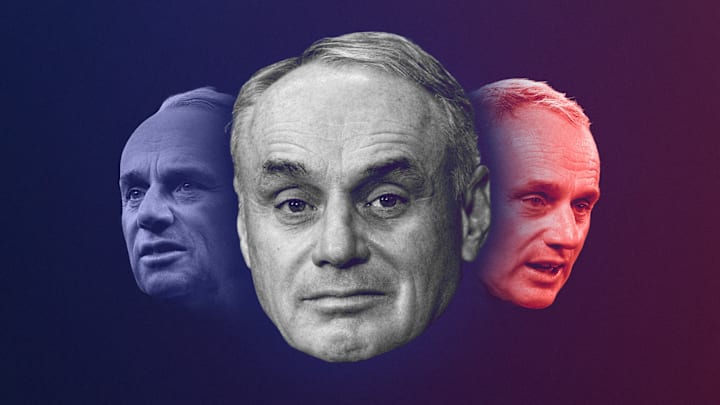It's the postseason, which means that hardly anything can happen on a baseball field without sparking at least a couple of unhinged conspiracy theories. The stakes are awfully high in October, after all, and every fan base is desperate to respond to failure by telling themselves that they were wronged — anything to avoid reckoning with the fact that maybe their team just wasn't good enough.
As MLB commissioner, Rob Manfred is an all-too-frequent target of those conspiracies. And that's especially true when a big-market team is involved: It doesn't take too much of a leap to look at how the presence of Los Angeles or Chicago or New York affects television ratings and start connecting the dots. (The fact that Manfred more closely resembles an alien brought down to Earth in order to take part in labor negotations rather than an actual fan of the sport admittedly doesn't help matters.)
So with the Los Angeles Dodgers taking on the Milwaukee Brewers in an already-electric NLCS this week, suspicions are high. Yes, it's the Brewers who entered this series as the NL's top seed after winning more games during the regular season, but come on: This is about as David vs. Goliath as baseball gets, from payroll size to front-row celebrity sightings. Naturally, people are going to ask questions about where the league office's loyalties really lie.
But what this column presupposes is: What if Manfred really was pulling for a Dodgers win ... but not for the reasons you think? Sure, the extra ratings are nice, but that's a one-time boost. Manfred hasn't hidden his desire to reshape the entire economic foundation of the sport, and if this postseason breaks right, he just might get his wish.
For more news and rumors, check out MLB Insider Robert Murray’s work on The Baseball Insiders podcast, subscribe to The Moonshot, our weekly MLB newsletter, and join the discord to get the inside scoop during the MLB season.
Rob Manfred needs the Dodgers to help him realize his salary cap dream
As you may have heard by now, the CBA between MLB and the players' union is set to expire at the end of the 2026 season. Everyone's gearing up for what figures to be a tense round of negotiations — especially since Manfred, and the 30 owners he works for, seem hell-bent on trying to finally institute a salary cap for the first time in league history.
This has been building for a while now, but it began boiling over as the Dodgers signed Shohei Ohtani, Yoshinobu Yamamoto, Blake Snell and others over the last two offseasons, running up a record payroll in the process. L.A.'s largesse has only poured fuel onto the long-standing grievances of small-market owners, who insist that they can't possibly be expected to compete if other teams are allowed to spend money hand over fist.
A Dodgers win in this NLCS, particularly a convincing one, would be even more grist for that particular mill, yet another sign in the eyes of Bob Nutting and Co. that the playing field needs to be leveled. The Brewers might have been able to put together a great regular season, but stars rule in October, and Los Angeles simply has more of them than anyone else.
A salary cap isn't what baseball needs, no matter what Rob Manfred thinks
Of course, the truth is a bit more complicated. Sure, the Dodgers do have financial advantages that most of the league does not, from a wealthy (even by billionaire standards) ownership group to a local TV deal that seems more and more egregious with each passing year to a diversity of revenue streams thanks to the presence of Ohtani and other Japanese stars. But while no one is arguing that the Rays could start spending $300 million a year tomorrow if they wanted to, the reality is that the ones to blame for the sport's increasingly extreme economic disparities are ... the owners themselves.
how much revenue each MLB team generated last year, and how much of that is going towards their payroll this year pic.twitter.com/UAZmHhaR8a
— BrooksGate (@Brooks_Gate) March 29, 2025
The league's smallest markets might not have Dodgers money, but they certainly have more than they're making out to. They just don't feel like pouring that money back into building a competitive baseball team, and why would they? The revenue-sharing and sponsorship and national broadcast rights and BAMTech checks cash all the same, whether there are fans in the stands and a good product on the field or not. Nutting and Co. might love the idea of a salary cap, but they'd hate the idea of a salary floor.
No, Manfred isn't going to buzz in and get a call changed during this series. There are no actual tin hats here. In his heart of hearts, though, you know he'd love a Dodgers win, not just for what it means for the now but what it means for the future — and how it would frighten most of the men he works for into submission.
